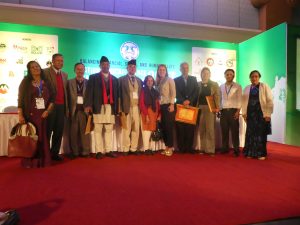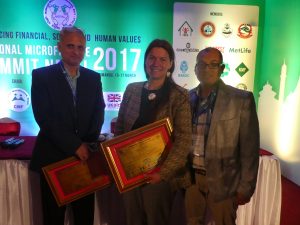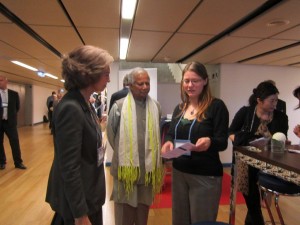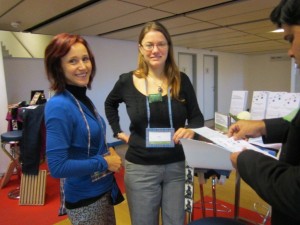A guest article from Radha Paudel originally published on her blog
Dear Greta and Djaffar, Namaste!
Let me first congratulate both of you., I (Anupa, Mili, Radha like to call I henceforth) am simply moved with the stories of you both. I have no words that would explain how much I admire you both.
Recently, my vision blurred when I saw your donation to one of the UN agency. I broke. Literally, I broke. You are repeating a mistake, simply repeating.
I do understand your emotional pain, you inspired the photos/videos of children with gasping especially from Asia and Africa. I have immense respect for your kindness, compassion, and empathy that ultimately wants to decrease poverty, and the consequences resulting from poverty. Sadly, you are contributing to increasing poverty instead of eliminating it.
I do know that you will not be happy with this letter, and I worry that this will break you. This particular agency is just an example. All UNs, many INGOs, and few NGOs fall into the same category. In order to avoid pointing fingers at one organization, I like to use the word of a development agency (DA) henceforth. Let me explain though it is not as new as Corona virus. It is an open secret but rarely mentioned especially in the global north.
Poverty increment
Do you know the operation cost of these DAs? Do you know who is working there? Do you know who gets the access to work there and why? Do you know how much salary they get? I do not like to explain everything here. You are better to calculate than me.
I only like to say that the people who are working there, are not exceptional people like you. They are the average people or may be less than average with other means for access to success. They graduate from the same schools with the same excellence. Definitely, there are not opportunities for all graduates who want to join there. Because of the irrational privileges provided by DA, the economic and social status changes after a few years. Eventually, the irreversible category formed and operated as modern poverty. Your donation played a role to divide the society at large. Here, your contribution doesn’t reach the poor children who are floating over the internet either from Asia or Africa.
Merely reached to the poor people
Here, your donation is on the way to reach the poor people but how much, and where? Could you ever confirm that your donation addressed the underlying cause of poverty or climate crisis or breaking the vicious circle between them. Do you know how long that program has been launched? Do you ever calculate the amount of dollars that actually reached the poor? Do you know how many stories are taken from them and to where it displayed? Do you know of their humiliating experience they have to go through? Do you compare the remuneration between the top level of employees and employee/volunteers who are reaching the poor family, finally? Those volunteers are working under hostile weathers, with no good shoes, no food and so many things but they do not get anything or merely a droplet. That droplet does not have the capacity of mutation as a novel Coronavirus to enhance the capacity of livelihood of this family. They could be individuals, CSO workers who can’t speak English, do not have fair white skin, and living in a rural setting or anyone who represents the base of the pyramid. They have the same capacity to serve, to grow but they never get the opportunity for it. Their brains are washed in way that they are happy to work as volunteers; they are local, they do not know computers and English that is why their knowledge, skills and resilience are not written as a theory of change or log frame or strategies for project management and eventually they are waste people by virtue of fate. DAs are there for getting things done as documented or as taught by the Universities in the global north instead of needs and rights of people of the global south. DAs have been working for more than six decades but what is the impact of it at large? In conclusion, the poorer are poorer and richer are richer. Few locals who silently accept all instructions or puppetism, or showcase as principle of inclusion, are well off. The rest of them and their support disappeared after a while as a rainbow of evening.
Liberation or dependency
Do you ever think whether your goal of donation meets or not? Are you helping for liberation or dependence? Why is it happening largely? Why the most of the poor people living with further poverty. Do you think that strategies developed by DAs are useful or exploitative or empowering? Do you think the employees are compatible for the people, culture and all for achieving your goal? Do the indigenous coping and resilience mechanisms are recognized and maximization of its use?
Contribute for corruption
Are you aware your donations help to institutionalize the corruption? Are you aware about the deep and huge psychological tug of war between government and DAs? Having the same time and more or less results, the people in DAs are enjoying the substantial privileges and claim that they are coming from the moon as outstanding. The governments are not happy with the way of working by DAs and the DAs are not happy with the way of working by the government. There are so many stories under the carpet. There is no functional system to maintain integrity and a transparent system mostly from both sides due to the individual approach instead of system. After a while, DAs hook influential people in government by providing the opportunity to travel aboard or consultancy opportunity by taking leave or anything. The fancy reports produced with the photos/videos of government people but it is not by system or no accountability. It’s just temporary knots between government and DAs for the sake of formality which are not relevant or less relevant with the reality. Instead of being transparent and integrity, the DAs are busy making the system corrupt, paralysed and dependent. If you do not trust me, see the response against COVID-19, pandemic. The government authorities were made busy for 365 days by DAs before the COVID-19 but the result was almost zero. It was not only now. Same was happen during the devastating earthquake 2015 and other countries from the global south. Because of their presence, so many local practices changed e.g. increased rental rates and majority of people cannot afford. In other side of the coin, the small NGO’s are battling for either arranging fake documents or writing fake reports. Most of them are unbale to produce same version of reports so they use the fund for hiring the consultants by manipulating the documents. In top of that, there was no fund for either operation cost or contribution of board members or both.
Mis-interpretation
Do you see the same level of understanding against the same condition or word? Have you ever thought that the operational definition of climate crisis or poverty is very different here than you think or experienced? Are you sure the foundation of yours and mine is the same? Do you consider the differences of contributing variables? Let me share one example. For you, bed and breakfast motel/hotel resemble attached toilet, hot and cold water, towels, tea sets at least. Your hotel is like a palace for me. In my country especially in rural setting, a hotel means a place for rest, could have toilet or not, common room where linens are used for more than a week and so many things. In contrast, the reports what you received are manipulated vastly as your desire in terms of words, frames and all. The poor people with the same status used three times differently like miserable condition, empower and miserable for proposal phase, reporting phase and re-proposal phase respectively. The consultants are hired for the proposal and report writing which is not based on reality but based on your requirements. They prepared a report like fiction Nobel. The same people write the different stories as your frameworks. In any community, there are outstanding personalities no matter whether it is Iran or Denmark or Sweden or Nepal. In Denmark or Sweden, any change in programming, changes the majority of the population but here only the changes took place who have potential already with or without opportunity or majority of population remain unchanged.
Way Forward
Of course, the global south has other issues that weaken the systems like unstable government, conflicts, and traditional cultures. Now, the people like you urged the global community to act, not talk or nice words in speech. Meanwhile, the COVID-19, pandemic also accelerate the idea of reflecting and redefine the strategy for equal and better future that includes the paradigm shifting on DA too as follows;
1. Harmonization of minds: Psychological and structural hierarchy should avoid. The people who want to love ransom money, they are free to join business. Working in DAs is for passion to work in difficult areas or difficult tasks that should not trade off with money. If the mechanism is similar to the government, with same level of benefits, the change is easier, equal, faster and sustained as well.
2. Poorer are leaders to alleviate poverty: To build the capacity of poor people and hold them accountable to them and their government, the donation should go directly to government or local NGOs/CSOs. They have the right to govern by themselves. Many scholars may claim that the government is corrupt or slow or anything. In a way and the other round, DAs keep saying such. As a result, the government not only boycotted but also weakened in many ways. DAs can develop mechanisms for transparency or monitoring their support.
3. Celebration of contextual attributes: The poor people must be in the centre means their language, skills, knowledge should be acknowledged by DAs. The reality and essence of reality should not twist or manipulate any more. One size does not fit all therefore, each community needs a different strategy. The frameworks, strategies and targets should revise according to the context. Either in Denmark or Sweden, the Prime Ministers are running here and there with minimal or without security. Why do DAs need such security by spending the money at the name of the poor. The DAs are not reaching out to the real poor people and producing a new layer of poverty that should stop. The global community must be ready to unlearn.
The donors, foundations, individuals are fatigued because of not having a significant impact against poverty. They are expecting the change or impact but do not try to understand the internal dynamics. They just fall in love with fancy photos/videos along with thank you letters. We know the world is complex, it does not move in a linear way thus its needs a multilinear approach to address too. Likewise, the charity model is also an old-fashioned model to work.
I know, I could not make the vaccine for the novel Corona virus but I can teach people, to do research. I may need a guide or mentor but not hold my hands to walk. The time has already changed. But the DAs and big philanthropists are busy to show up their logos, to be popular and compete to make us paralysed.
In this circumstance, the iconic people like you both, need to liberate from the preoccupied mind about us. You need to stand for breaking the stereotyped development and human right practices. It sounds insane but it is the truth and demand of today.
Dear Greta and Djaffar,
Let’s challenge ourselves and this world. If you do the same things as before there is no point to come up with new organizations and campaigns. Let’s join the hands from global south and north and change the narratives of development for the sake of people and planet.
Hope you both are open to discuss this matter. I also have so much to share about the discrepancies or controversies between you and me or global north and south and so many commonalities and possibilities to bring synergies. Hope you won’t overlook my request. As the novel Corona virus taught us, we need to stop, we need to be slow and we need to think for the people and planet. All in all, are the members of the same family.
Stay Safe !
Sincerely,
Anupa Regmi, Nepal, regmianupa17@gmail.com
Milli Adhikari, USA, tadhikari@berkeley.edu
Radha Paudel, Nepal, rpaudel456@gmail.com[:]




